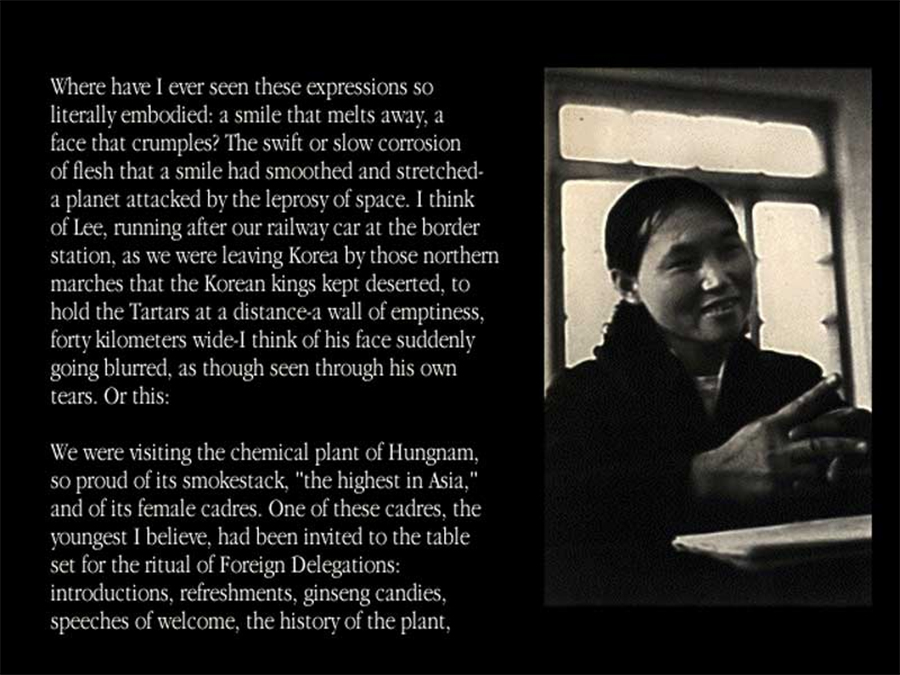COREENNES_SIX JOURS STACK015

- Id : 821
- Catégorie : PHOTO
- Séquence : Coréennes_6Jours
- Card : COREENNES_SIX JOURS STACK015
Navigation :
Médias :
No clipNo sound
Text :
Where have I ever seen these expressions so
literally embodied: a smile that melts away, a
face that crumples? The swift or slow corrosion
of flesh that a smile had smoothed and stretched-
a planet attacked by the leprosy of space. I think
of Lee, running after our railway car at the border
station, as we were leaving Korea by those northern
marches that the Korean kings kept deserted, to
hold de Tartars at a distance -a wall of emptiness,
forty kilometers wide- I think of his face suddenly
going blurred, as though seen through his own
tears. Or this:
We were visiting the chemical plant of Hungnam,
so proud of its smokestack, ‘the highest in Asia, »
and of its female cadres. One of these cadres, the
youngest I believe, had been invited to the table
set for the ritual of Foreign Delegations:
introduction, refreshments, ginseng candies,
speeches of welcome, the history of the plant,
refreshments, production figures, refreshments,
Do you have any questions? -and we did. Of course
the French spirit immediately went to work on the
female cadre: Was she married? Would she marry
soon? Was she thinking of marriage? How did she
go about giving orders to men? All these questions
were completely out of place in a Communist and
Korean world, but the she-cadre answered with the
most generous kindness, cupping her beautiful
plebeian hands over her face when it was a
question of marriage (« She is confused, »as our
dragoman, Mr. Ok, gleefully explained…). Finally,
Marx winning out over Offenbach after all, we came
to the economic and professional information,
and, in a detour, to this question: « What do your
parents do? »
At the moment I was sunk in my camera. It was
on the Rollei’s ground glass that I saw the
metamophosis, the smile vanishing into pain
like water drunk by sand. Everyone lowered their
eyes into that chasm of silence, hastily inventing
an imaginary Rolleiflex, a viewfinder to shelter their
gaze, and I heard Mr. Ok explain in a half-
whispered voice that yes, her parents had died
during the war, that it was the case for many
Koreans, and that yes, they felt great pain when it
Was mentioned -and now the young woman’s face
was covered in tears, but she did not lower her
head, and the hands that had hidden her laughter
lay immobile on the table.
This instant was hers: it was hers to make use of,
and no one had the mediocre audacity to offer
words of consolation. Just as she had had the
courage of her tears, so she had the courage to
break the silence that we had respected. The
extraordinary hymn of hate and willpower that
followed would need more than a story and an
image to do it justice: holding herself very straight,
looking at no one, her hands drawn behind her,
speaking quickly, blending the words ofher pain
And the slogans of the Party, she said that she
hated the Americans who had killed her parents,
but that now her path was perfectly clear, that
she would constantly have to overcome her own
limits, that thanks to the Party her pain itself had
a meaning, and that by working for her country
she would revenge her dead… All of that, in
another tone of voice, would have only been the
catechism of a good militant: here it became
both a Mass of Shadows and a somber Hallelujah.